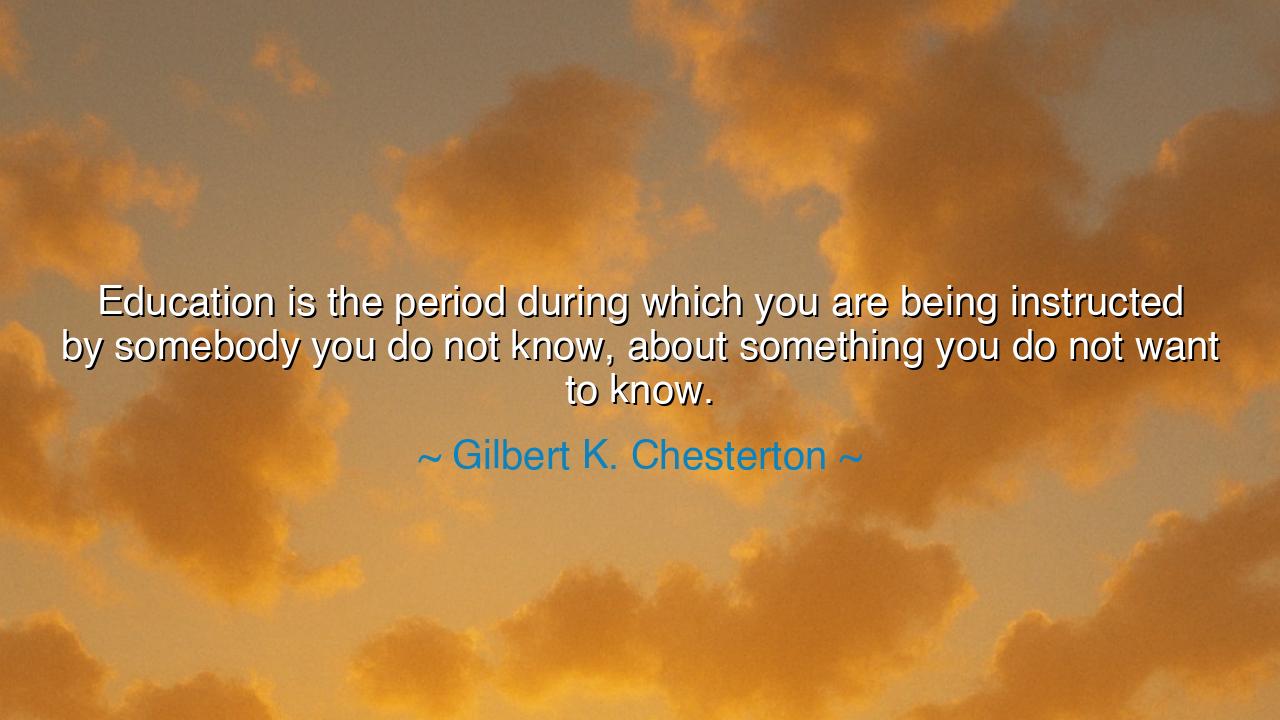
Education is the period during which you are being instructed by
Education is the period during which you are being instructed by somebody you do not know, about something you do not want to know.






“Education is the period during which you are being instructed by somebody you do not know, about something you do not want to know.” Thus spoke Gilbert K. Chesterton, that master of paradox, whose wit hid profound truth beneath a cloak of humor. Though his words sparkle with jest, they cut deep into the heart of what education often becomes — a ritual of obligation rather than a pilgrimage of wonder. With this saying, Chesterton challenges both teacher and student, reminding us that learning, when stripped of curiosity and connection, can become a hollow exercise, a weary march through facts divorced from the soul’s desire for meaning.
In this quote, Chesterton reflects the tension between instruction and inspiration, between what we are told to learn and what we long to understand. To be “instructed by somebody you do not know” speaks to the distance that too often lies between the giver and receiver of knowledge — a stranger’s voice echoing across a classroom, offering truths that feel lifeless because they have not been made our own. And to learn of “something you do not want to know” is the tragedy of education without purpose — a process where knowledge is imposed, not discovered; memorized, not lived. Chesterton mocks this empty learning not to dismiss education, but to awaken us to its true meaning: that learning must speak to the heart before it can dwell in the mind.
In the ancient days, the great teachers did not merely instruct — they walked beside their students. Socrates, in the streets of Athens, did not lecture from a pulpit; he questioned, provoked, and drew wisdom out of those around him, as a sculptor draws a statue from stone. His pupils followed him not out of compulsion, but out of awe. They were not told what to think, but taught how to see. This is the education of the soul, which Chesterton mourns the loss of in his modern age — and which our own age, filled with screens and syllabuses, has nearly forgotten altogether.
For in every generation, schools risk becoming factories of facts — places where knowledge is stored, sorted, and measured, but seldom felt. The teacher becomes a stranger, the subject a burden, and the student a vessel to be filled rather than a fire to be lit. Yet even in such conditions, the spirit of learning waits to be awakened. It takes but one teacher who sees rather than instructs, and one student who begins to wonder rather than obey, for the ancient light of true education to return. For education is not the piling up of information, but the awakening of awareness — a sacred meeting between the known and the unknown, where both teacher and student discover new worlds together.
Consider the story of Helen Keller and her teacher Anne Sullivan. Helen, deaf and blind from infancy, lived trapped in a prison of darkness and silence. To her, the world was chaos — a confusion of touch and sensation without meaning. But Anne Sullivan, her devoted instructor, refused to be merely a stranger “teaching something unwanted.” She became the bridge between Helen’s isolation and the universe beyond. When she spelled the word “water” into Helen’s hand at the well and poured cool liquid over her skin, a miracle happened: the word and the reality became one. In that moment, education was reborn — not as instruction, but as revelation. Helen learned not because she was told, but because she desired to know.
Chesterton’s jest, then, carries both irony and prophecy. He knew that the tragedy of education is not ignorance, but indifference — not the lack of information, but the loss of joy. The “period” he describes is a stage of life many endure but few truly live. Yet he also implies that this need not be so. For once we remember that learning is not a duty but a privilege, that every fact hides a wonder, and that every teacher is a fellow traveler in the search for truth, then education becomes not a prison but a pilgrimage.
So, my child, when you sit before the unknown, do not scorn it because it seems dull or distant. The things you do not want to know may hold the key to who you are meant to become. Seek not only to be taught, but to understand; question not only your teacher, but yourself. And if you are the one who teaches, do not be content to instruct — strive to inspire. Speak not only to the mind, but to the soul. For the greatest education is not when a student remembers what he was told, but when he awakens to what he loves.
Thus, Chesterton’s humor hides a holy truth: education is not the memorization of another’s wisdom, but the discovery of one’s own. The stranger at the front of the class may one day become a guide, and the subject once hated may one day light your path. For the purpose of learning is not to endure knowledge, but to be transformed by it — to turn information into insight, and instruction into understanding. Only then does the period of education become the beginning of wisdom.






AAdministratorAdministrator
Welcome, honored guests. Please leave a comment, we will respond soon